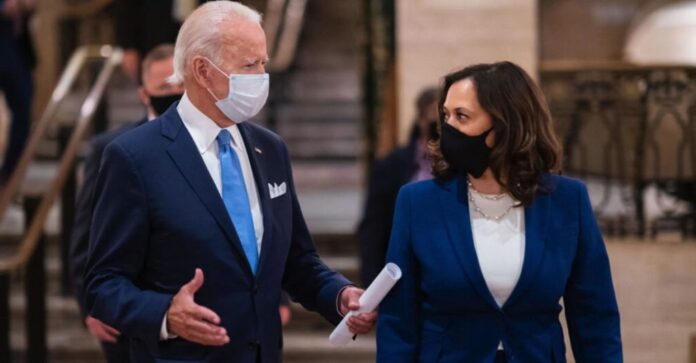
By Stacy M. Brown, NNPA Newswire Senior National Correspondent
President Joe Biden unveiled a $6.8 trillion budget plan that includes aiding several social programs, raising taxes on the wealthy, and decreasing the country’s debt by $3 trillion over the next decade.
While the plan has little chance of passing through the GOP-led House, the President doubled-down on a previous executive order that directs the federal government to advance an ambitious equity and racial justice agenda.
Biden reminded lawmakers that his administration has made significant progress advancing equity across the federal government, including by releasing a second executive order last month that strengthens the government’s ability to create opportunities for communities and populations that have been historically underserved, and one that “continues to build an America in which all can participate, prosper, and reach their full potential.”
Among other things, Biden’s budget seeks the following:
Advance Maternal Health and Health Equity.
The Budget includes $471 million to support implementation of the White House Blueprint for Addressing the Maternal Health Crisis to reduce maternal mortality and morbidity rates and address persistent disparities; expand maternal health initiatives in rural communities; implement implicit bias training for healthcare providers; create pregnancy medical home demonstration projects; and address the highest rates of perinatal health disparities, including by supporting the perinatal health workforce.
In addition, the Budget requires all States to provide continuous Medicaid coverage for 12 months postpartum, eliminating gaps in health insurance at a critical time.
The budget expands access to quality, affordable health care by investing $150 billion over 10 years to improve and expand Medicaid home and community-based services, such as personal care services, which would allow older Americans and individuals with disabilities to remain in their homes and stay active in their communities as well as improve the quality of jobs for home care workers.
To bolster the health care workforce, the budget provides a total of $966 million in 2024 to expand the National Health Service Corps, which provides loan repayment and scholarships to healthcare professionals in exchange for practicing in underserved areas, and a total of $350 million to expand programs that train and support the nursing workforce.
Additionally, the budget supports survivors of domestic violence and other forms of gender-based violence by significantly increasing support and protect survivors of gender-based violence, including $519 million for the Family Violence Prevention and Services (FVPSA) program to support domestic violence survivors—double the 2023 enacted level.
The President also wants to guarantee adequate and stable funding for HIS.
The budget requests an additional $3 billion in 2024 for a total of $8.1 billion in discretionary resources, and proposes all IHS resources as mandatory beginning in 2025.
Biden also proposes to provide $90 million to support State and local fair housing enforcement organizations and to further education, outreach, and training on rights and responsibilities under Federal fair housing laws.
The budget also invests in HUD staff and technical assistance to affirmatively further fair housing and reduce barriers that restrict housing and neighborhood choice.
The White House said the budget would expand access to affordable rent through the Housing Choice Voucher Program, which currently provides 2.3 million low-income families with rental assistance to obtain housing in the private market.
Biden wants to provide $32.7 billion, an increase of $2.4 billion over the 2023 enacted level, to maintain services for all currently assisted families and—together with HCV program reserves—to expand assistance to an additional 180,000 households, particularly those who are experiencing homelessness or fleeing domestic violence.
To further ensure that more households have access to safe and affordable housing, the budget provides $9 billion in mandatory funding to establish a housing voucher program for all 20,000-youth aging out of foster care annually; and provides $13 billion to incrementally expand rental assistance for 450,000 extremely low-income veteran families, paving a path to guaranteed assistance for all who have served the nation and are in need.
To prevent and reduce homelessness, the budget provides $3.7 billion, an increase of $116 million over the 2023 enacted level, for HUD Homeless Assistance Grants to meet renewal needs and expand assistance to approximately 25,000 additional households, including survivors of domestic violence and homeless youth.
The budget also seeks to prevent evictions by making the legal process during eviction proceedings fairer, and mitigate future housing instability, and providing $3 billion in mandatory spending for competitive grants to promote and solidify state and local efforts to reform eviction policies by providing access to legal counsel, emergency rental assistance, and other forms of rent relief.
Also, to help ensure that every student receives a high-quality education, the Budget provides $20.5 billion for Title I, which would continue historic progress in increasing Title I funding over the past two years.
Title I provides critical funding to 90 percent of school districts across the nation, helping them to provide students in low-income communities the academic opportunities and support they need to succeed.
The administration said every child with a disability should have access to the high-quality early intervention, special education services, and personnel needed to thrive in school and graduate ready for college or a career.
The budget invests $16.8 billion in Individuals with Disabilities Education Act (IDEA) grants to support special education and related services for more than seven million students with disabilities in grades Pre-K through 12, an increase of $2.1 billion above the 2023 enacted level.
Click here to read a White House Fact Sheet on the President’s proposal.
Information for this report was provided by the White House.



